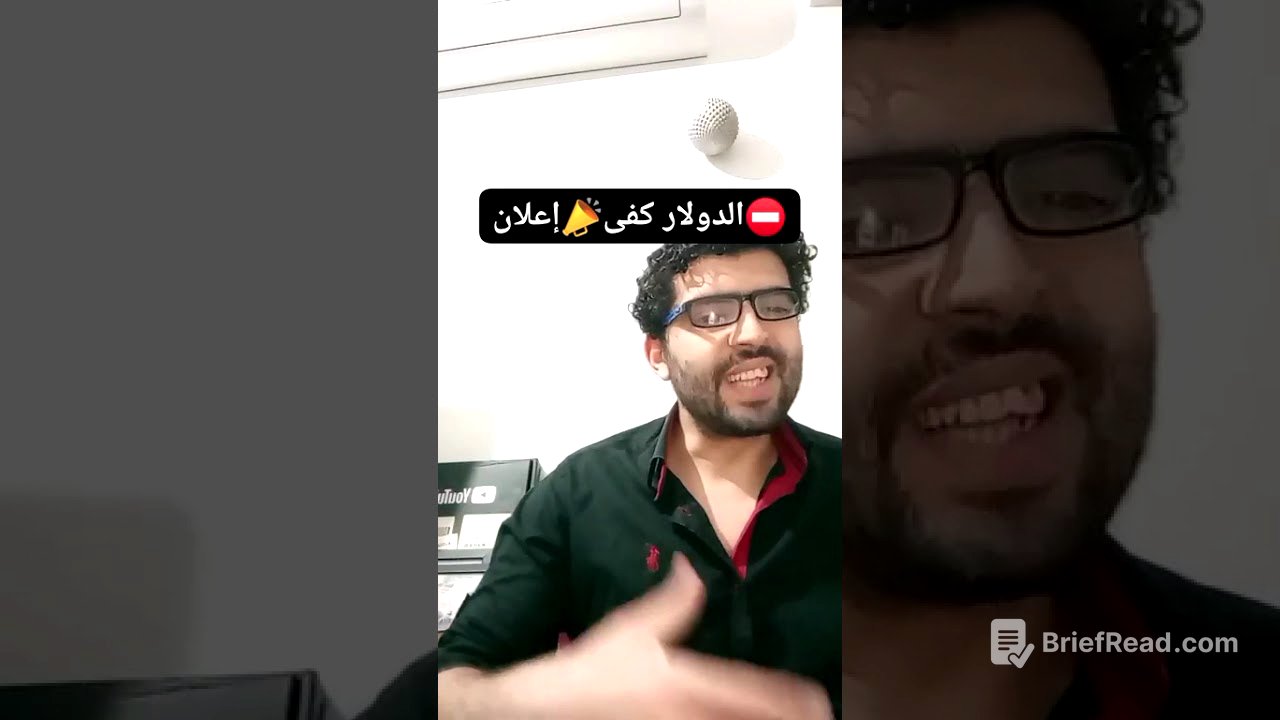TLDR;
This video discusses the Egyptian economy, focusing on the dollar's stability, electricity rationing, rental laws, and the emigration of millionaires. It critiques the government's approach to economic issues, questioning the sustainability of current policies and their impact on citizens.
- The Prime Minister's announcements about the dollar's stability are questioned, especially with rising remittances from Egyptians abroad.
- The continuation of electricity rationing despite sufficient gas supply raises concerns.
- Changes to rental laws are causing disputes between landlords and tenants.
- A report indicates that 100 millionaires are leaving Egypt, taking significant wealth with them, while Morocco is attracting millionaires.
Introduction [0:02]
The speaker welcomes viewers and introduces the topic of the Egyptian economy, particularly focusing on the dollar situation. He critiques the repetitive nature of press conferences where officials announce the dollar's stability without addressing the underlying issues. He emphasizes that simply stating the dollar is "in the pan" is insufficient; the focus should be on whether it is truly abundant, especially with increased remittances from Egyptians abroad.
Dollar Stability and Economic Capacity [0:52]
The speaker questions the Prime Minister's reassurance messages about the dollar's abundance, suggesting this should be the Central Bank Governor's responsibility. He argues that the reported capacity is derived from loans and promises, not genuine economic strength. He contrasts "capacity" with true "ability," which involves meeting demand without limitations, rather than cutting back on essential services to maintain the appearance of sufficiency.
Electricity Rationing [2:38]
The speaker criticizes the continued electricity rationing plan despite assurances that gas supplies are sufficient. He questions the logic of maintaining emergency measures after the initial crisis has passed, especially when neighboring countries in conflict did not resort to such measures. He argues that fighting the kettle and restricting elevator use is unacceptable when resources are supposedly available.
Rental Law Disputes [4:29]
The speaker addresses the ongoing disputes between landlords and tenants due to changes in rental laws. He highlights the potential for increased violence and social unrest as a result of these changes. He questions the state's ability to provide alternatives for those who may be displaced, particularly given the lack of clear specifications for who qualifies for assistance.
Egyptian Financial Resources [8:21]
The speaker discusses the Prime Minister's statement that Egypt's local resources of hard currency meet the state's needs. He questions the accuracy of this statement, suggesting that it may involve cutting necessary expenses to create the illusion of sufficiency. He lists tourism, the Suez Canal, exports, and remittances from Egyptians abroad as local resources.
The Emigration of Millionaires [16:06]
The speaker highlights a report indicating that 100 millionaires are emigrating from Egypt this year, taking approximately $800 million with them. He contrasts this with Morocco, which is attracting millionaires. He questions why Egypt's economic environment is repelling wealthy individuals and calls for an official examination of the factors driving this emigration.
Bonds and Fertilizer Exports [19:38]
The speaker discusses Egypt's sale of $1 billion in Sukuk (Islamic bonds) to the Kuwait Finance House. He notes that while the type of financing is not the primary issue, the need to borrow such large sums raises concerns about the country's financial stability. He also mentions that fertilizer factories will resume operations in July, following a 31-day shutdown due to gas shortages, and that Egypt's fertilizer exports increased by 2% despite these problems.
Fertilizer Prices and Gas Supply [22:52]
The speaker explains how the increase in fertilizer prices, resulting from gas shortages and factory shutdowns, directly impacts the cost of food for consumers. He emphasizes that even those who do not farm are affected by these issues. He also mentions that the Egyptian Natural Gas Company has granted four concession areas in the Mediterranean and Nile Delta to international companies for exploration.
Soft Drink Production and Debt [27:00]
The speaker notes a partial halt in soft drink production due to reduced gas supply, leading to non-carbonated drinks. He also presents alarming statistics about Egypt's debt burden: 87% of taxes go to debt interest, 64% of the new budget is for debt installments and interest, and 58% of new loans are used to pay off old ones. He concludes that these factors are the reason for the ruin of the Egyptian budget and the increase in prices.









